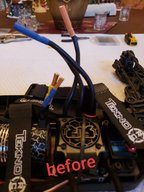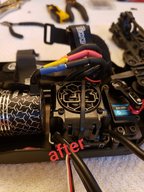- Messages
- 104
- Reaction score
- 118
- Arrma RC's
- Talion
Has anyone soldered 4mm bullets. I watched the video about the 90 degree soldering and it's an awesome idea but didn't really teach me anything. Does anyone have a link they can share or have any info? BTW I can't really solder so, I don't know. Maybe I should practice on some junk wire first.



